Botox is a popular choice for diminishing wrinkles and fine lines in cosmetic treatments. However, the question "Can Botox cause acne?" often lingers in the minds of many considering this treatment.
This blog post delves into the intricate relationship between Botox injections and skin health, aiming to unravel the truth about Botox and its potential impact on acne.
Also read: How to choose the best acne treatment
Biggest Take-Aways:
- Botox does not directly cause acne but may lead to temporary skin reactions that resemble acne.
- Choosing a qualified and experienced Botox provider is crucial for minimizing potential skin issues.
- Proper aftercare, including cleanliness and gentle skincare, is essential following Botox injections.
- Incorporating Exposed Skin Care into your skincare regimen can aid in managing acne and enhancing overall skin health, especially after cosmetic procedures like Botox.
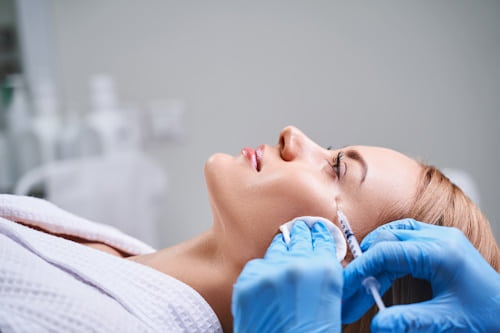
Understanding Botox and Its Use in Cosmetic Treatments
Before diving into the core question, it is crucial to understand what Botox is and how it is used in cosmetic treatments. Botox, or botulinum toxin, is a neurotoxin widely used for cosmetic purposes, especially in treating facial wrinkles and fine lines.
The Science Behind Botox
Botox works by causing temporary paralysis of muscles in the face, smoothing out wrinkles, and preventing the formation of new ones. It is commonly used to treat forehead lines, crow's feet, and frown lines.
Botox Procedure: What to Expect
During a Botox appointment, a trained professional injects a small amount of botulinum toxin into specific muscles. This minimally invasive procedure typically takes only a few minutes and does not require significant downtime.
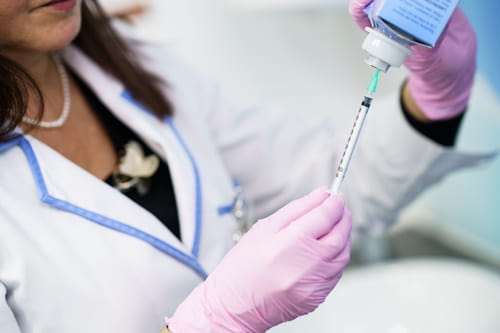
Can Botox Cause Acne? Exploring the Connection
Now, let's address the primary concern: can Botox cause acne? While Botox is FDA-approved and generally considered safe, it is important to explore its potential side effects, particularly concerning acne development.
Analyzing Common Side Effects of Botox
Common side effects of Botox include swelling and bruising at the injection site, temporary muscle paralysis, and, in rare cases, an allergic reaction. However, the occurrence of acne as a direct result of Botox is not widely reported in medical literature.
Investigating Acne Post-Botox Treatment
Some individuals report developing pimples or bumps after Botox injections, particularly in areas like the forehead and around the eyebrows. It is essential to consider several factors, such as the patient's skin type, the cleanliness of the treated area, and the individual's reaction to the topical numbing agent used during the procedure.
Factors Contributing to Acne After Botox
Understanding the various factors that might contribute to acne development post-Botox is crucial in addressing whether Botox injections can cause acne.
Injection Site Reactions
The process of getting Botox involves injections, which can lead to micro-injuries in the skin. These micro-injuries, combined with the body's natural healing response, might temporarily increase the likelihood of developing pimples in the treated area.
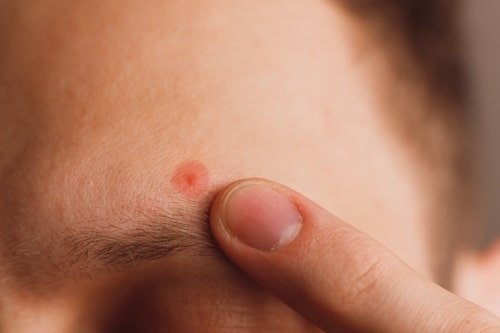
Skin's Response to Cosmetic Treatments
Each individual's skin reacts differently to cosmetic treatments. Factors like pore size, sebum production, and sensitivity to ingredients used to reconstitute Botox could influence the skin's response, potentially leading to acne issues.
Allergic Reactions and Botox
While rare, some individuals might experience an allergic reaction to the botulinum toxin or the additives used in the Botox formulation. This reaction might manifest as bumps or pimples, often mistaken for acne.
Distinguishing Between Acne and Other Skin Reactions
It is crucial to differentiate between true acne and other skin reactions that might occur after a Botox treatment.
Identifying Acne vs. Injection Site Reactions
Acne is characterized by pimples, blackheads, and whiteheads, often caused by clogged pores and bacterial growth. In contrast, injection site reactions typically manifest as redness, swelling, or small bumps that usually resolve within a day or two.
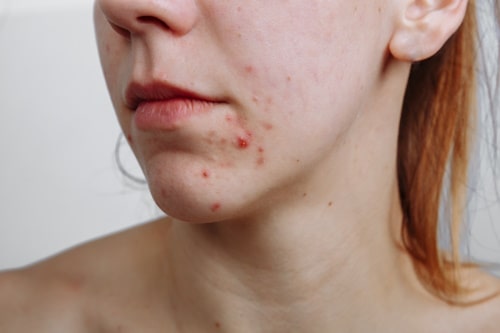
Understanding Botox-Related Skin Issues
Botox-related skin issues might include temporary bumps or redness at the injection site, often resulting from the body's natural response to the injection. These symptoms may differ significantly from typical acne lesions.
When Botox Could Potentially Exacerbate Existing Acne
For individuals who have never had an acne issue, Botox is unlikely to cause new acne development. However, for those with pre-existing acne, the stress on the skin from Botox injections might exacerbate their condition temporarily.
Harnessing the Power of Exposed Skin Care for Acne Management
Exposed Skin Care emerges as a beacon of hope in the journey to manage acne effectively. Whether you're battling persistent pimples or dealing with the aftermath of a cosmetic procedure like Botox on the forehead, Exposed Skin Care offers a holistic solution.
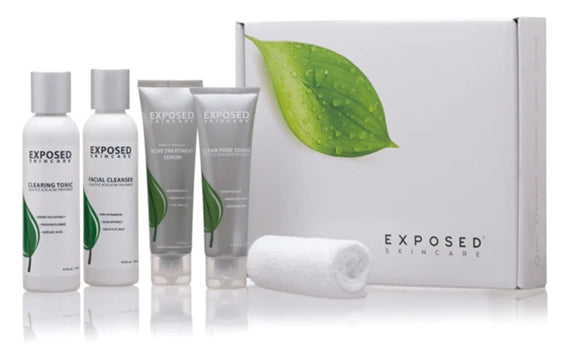
The benefits of Exposed Skin Care are:
- Reduces Appearance of Forehead Wrinkles: Regular use can help diminish the appearance of forehead wrinkles, which is often a concern for those considering Botox in the forehead.
- Targets Pimple Formation: Say goodbye to the frustration of waking up with pimples all over my forehead. Exposed Skin Care's advanced formula targets the root cause of acne, preventing new breakouts.
- Soothes Post-Procedure Skin: If you've just popped a pimple or undergone a botulinum toxin injection, Exposed Skin Care's gentle yet effective ingredients soothe and heal your skin, reducing complications and aiding in quicker recovery.
- Balances Skin's Oil Production: Overactive sweat glands and sebum production can exacerbate acne. Exposed Skin Care balances these factors, making it a great complement to treatments like dermal fillers or Botox.
Whether you're a regular at the medical spa or new to cosmetic procedures, incorporating Exposed Skin Care into your regimen can significantly enhance the health and appearance of your skin.
Conclusion
In conclusion, the relationship between Botox and acne is a complex one. For those unsure about Botox's impact on their skin, it's essential to understand that while Botox can cause certain skin reactions, these are generally different from typical acne.
Often, what is thought to be a pimple could be a minor, temporary side effect of the injection, like a micro-injury, which usually goes away after a few hours. The role of a skilled Botox provider is crucial in minimizing these skin reactions.
By choosing a qualified injector, you can reduce the chances of unwanted side effects. Proper technique ensures that complications like drooping brows or excessive sweating are less likely to occur.
While Botox primarily addresses lines and wrinkles, its interaction with existing skin conditions requires consideration. As a measure, incorporating products like Exposed Skin Care can be beneficial. It helps manage potential skin issues post-treatment and maintains overall skin health.
Botox is not the sole cause of acne, yet it requires careful handling to ensure the best results for your skin. Combining treatments like Botox with a dedicated skincare regimen, including products like Exposed Skin Care, can significantly enhance your overall skin health and appearance.
FAQs
Can Botox Injections Directly Cause Acne?
Botox injections do not directly cause acne. However, they can lead to skin reactions resembling acne, such as small bumps or redness at the injection site.
What Are the Common Side Effects of Botox?
Common side effects of Botox include temporary bruising, swelling at the injection site, and, in rare cases, allergic reactions. These effects typically resolve quickly.
How Can I Minimize the Risk of Acne After Botox?
To minimize the risk, ensure the injection site is clean, choose a qualified Botox provider, and discuss any skin concerns before treatment. Additionally, using gentle skincare products can help.
Does Exposed Skin Care Help With Acne Post-Botox?
Yes, Exposed Skin Care can help manage acne post-Botox. Its formula targets acne-causing factors and soothes skin, making it beneficial for post-procedure care.

















